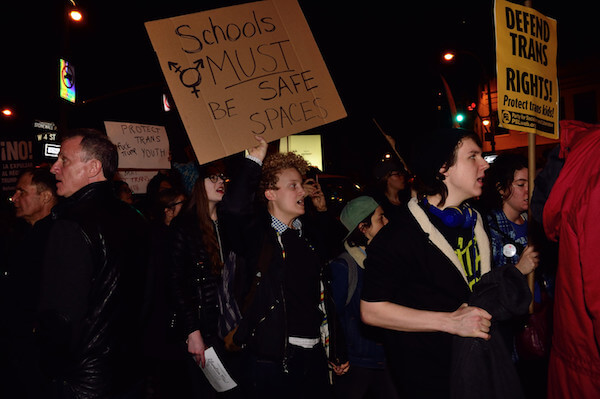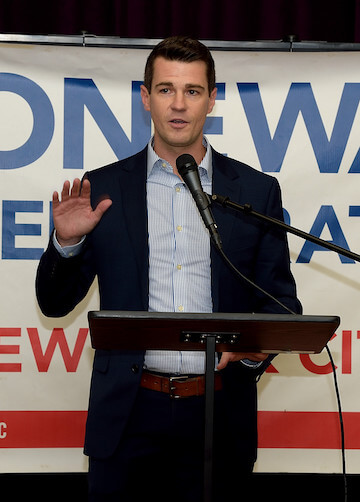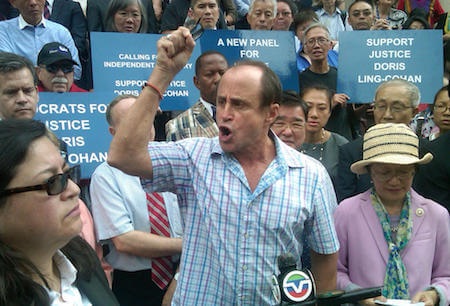ILLUSTRATION BY MICHAEL SHIREY
BY PAUL SCHINDLER | When veteran Harlem Democratic Congressman Charlie Rangel faced stiff — but ultimately unsuccessful — primary opposition from State Senator Adriano Espaillat, in both 2012 and 2014, State Senator Gustavo Rivera, who represents portions of Rangel’s district in the Bronx, endorsed the challenger.
So when Rivera drew a challenger in the September 9 State Senate primary, the 84-year-old lion of the US House of Representatives may have figured it was just old-fashioned political payback to support Rivera’s foe.
But wait — welcome to the 21st century.
That challenger is not just any old Bronx pol. True, Fernando Cabrera, who is 50, has been a member of the City Council for the past four years. But he is also the senior pastor at New Life Outreach International in the Kingsbridge section of the Bronx. Cabrera has used that perch to stand guard against what he has called “the cultural shifters going after our young people.”
In a remarkable video he made in Uganda that is posted on YouTube (since removed, though activist and blogger Andrés Duque made a copy, which is posted at the end of this story), Cabrera described the “cultural shifters” throughout history as a despotic rogues’ gallery — Communists, Nazis, the North Korean government. And those pushing for marriage equality.
Cabrera’s “war for our children” led him to lead a 2012 march over the Brooklyn Bridge demanding that the Department of Education end its policy barring church congregations from meeting in public schools. It took him to anti-marriage equality actions, including an 11th hour rally at City Hall just days before the state gay marriage law was enacted.
Harlem Democratic Congressman Charlie Rangel. | US CONGRESS
And it has taken him to events organized by the Family Research Council, a stridently anti-gay organization that has been condemned as a hate group by the Southern Poverty Law Center. FRC spokespeople at one time or another have endorsed criminal penalties for homosexual conduct and praised Uganda’s move toward harsh punitive measures against the LGBT community and its supporters. Amidst a worldwide furor over proposed legislation that, in its early drafts, earned the moniker “Kill the Gays” bill, Cabrera himself turned up in Uganda, praising its leaders as “the righteous.”
Rangel, though bruised in recent years by scandal and two political near-death experiences at the hands of Espaillat, remains a towering figure on Capitol Hill and is perhaps the most powerful African-American to ever serve in the House. A tireless civil rights advocate, he was one of only 67 with the gumption to vote no when the Defense of Marriage Act came up in 1996 — versus 342 who embraced the anti-gay measure.
How did Rangel, then, reconcile himself to endorsing Cabrera?
A week after news of his endorsement came out, his office was offering the same explanation it gave the New York Post in the announcement’s immediate aftermath..
“The congressman has always been and will continue to be a champion of civil rights and the LGBT community,” said Hannah Kim, Rangel’s communications director. “He will work with current and future local elected leaders to join him in this effort.”
That language initially came in response to a letter from LGBT community organizations and elected officials challenging Rangel’s choice in the primary. The August 28 letter noted Cabrera’s opposition to marriage equality and said that he “has continued to express discriminatory and regressive views on marriage, protections for the transgender community, and women’s rights.”
It also pointed to his ties to the Family Research Council and the American Family Association.
“Council Member Cabrera has made it clear that he does not stand with us,” the letter stated, before concluding with a unambiguous spanking of Rangel: “Congressman, your endorsement in this race tarnishes your long history of supporting LGBT rights and illustrious record of supporting progressive candidates for office.”
Bronx City Councilman Fernando Cabrera. | NEW YORK CITY COUNCIL
The letter was signed by the Empire State Pride Agenda, seven out LGBT elected officials — Senator Brad Hoylman, Assemblymembers Deborah Glick and Danny O’Donnell, and Councilmembers Corey Johnson, Carlos Menchaca, Ritchie Torres, and Jimmy Van Bramer — the Stonewall Democratic Club of NYC, Brooklyn’s Lambda Independent Democrats, and the Bronx Rainbow Independent Democratic Association.
The letter also took the opportunity to make the case for incumbent Rivera, noting his support for marriage equality, the long-stalled Gender Expression Non-Discrimination Act, and Hoylman’s bill to bar mental health professionals from subjecting patients who are minors to “sexual orientation change efforts” — so-call reparative therapy.
The 38-year-old incumbent, first elected in 2010, also advocated for an end to the use of condoms as evidence in prostitution arrests and repeal of the ban on using Medicaid funding for gender transition-related health care.
Rivera is an advocate for women’s reproductive rights, the letter noted, in contrast to Cabrera’s outspoken anti-choice stance.
After working in New York politics in a variety of City Council and state legislative campaigns and on the staff of US Senator Kirsten Gillibrand, Rivera came on strong four years ago, defeating Democratic Senator Pedro Espada, long a target of criminal investigation and now serving a federal prison term for theft of hundreds of thousands of dollars from a health care non-profit he controlled.
Ethics was a big part of Rivera’s appeal — and at a recent Manhattan reelection fundraiser, he joked that all three of his predecessors in the Senate seat he holds ended up in jail.
Rivera is also a key figure in a surging progressive movement finding its feet in the Bronx. As Councilman Ritchie Torres campaigned last summer to become the first out gay elected official from the borough, he credited Rivera as a mentor. Should the Democrats gain control of the Senate next year, Rivera will become chair of the Health Committee, a vital post in his view for addressing the health disparities facing many poor communities in his borough. He would be the first person of color and the first senator from the Bronx to head up that committee.
State Senator Gustavo Rivera with his Bronx colleague City Councilman Ritchie Torres, the borough's first openly gay elected official. | GAY CITY NEWS
Not shy about bringing a little elbow into the game, Rivera is taking on the incumbent Democratic senator in the adjoining district, Jeff Klein, over his defection from the rest of the conference and leadership of a five-member rump faction that caucused and shared power with the Republicans in the past two years. Rivera’s endorsement of Klein challenger Oliver Koppell led Klein’s Independent Democratic Conference to consider embracing Cabrera, but at the end of the day its members said he failed certain “litmus” tests.
Rivera, though, is sticking with Koppell, who joined him at the recent Manhattan fundraiser.
“I made an endorsement and I see know reason to back away from it,” Rivera said, even as he hastened to emphasize, “I am focused on my race.”
In spite of the intra-Bronx battle with Klein, Rivera has the support of Borough President Ruben Diaz, Jr., and is reporting about $175,000 in available campaign funds versus just under $40,000 for Cabrera.
Taking nothing for granted, Rivera makes certain to underscore the radical right nature of his opponent, who did not respond to Gay City News’ phone and email requests for comment.
“To be anti-gay and anti-choice is one thing,” he told Gay City News. “But having ties to and relationships with organizations like the Family Research Council, which is involved in all kinds of atrocities, like sending people over to help develop the Kill the Gays bill in Uganda…”
Then, translating a phrase from Spanish, Rivera added, “Telling me who you walk with tells me who you are.”






































